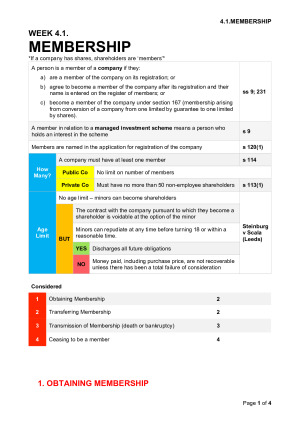LLH305 Corporate Law - Topped the subject with these detailed, graphic, easy to read notes
Subject notes for QUT LLH305
Description
Prepared by a 5th year law student with a GPA of 6 . 83. Received a 7, and was the highest result in the academic year. Six months later, I graduated ranked second from 537 students in the graduating year. Do not be scared by the size. These notes have been separated out so as not to be cluttered and allow for easy readability. They can easily be printed 2 per page. These notes have been prepared with the utmost clarity. The entire document is easy to follow, with clear structures delineated at the beginning of each section in a clear red table. Headings are colour coded throughout, with elements clearly separated. All details have been tabulated, meaning authorities and facts are clearly separated. Whether something is satisfied or not is clearly identified through a 'yes' or 'no' box in green or red, allowing you to easily filter through in an exam. Notes have been prepared as individual docs and merged, meaning the page count at the bottom of each individual section is reset. That way, when working through a template in an exam, you know how many pages you have to get through to complete a question. Further, each element has been given its own page number within its own document (making it easier to refer to at the time, compared with making a really long table). Pages have been intentionally left blank throughout for this purpose. My notes were categorised under the following headings: (Student VIP is not letting me number the headings - my apologies) What is a Company? Australian Corporate Law overview Promoter & Pre Incorporation Contracts Incorporation and Company Types Separate legal entity Corporate Constitution Internal Management Rules Scope of capacity and breach of objects clause Enforcement of constitution Altering constitution Membership Directors Company Organs Contracting with the company Corporate Governance Civil Penalty Regime Duty to act in good faith and exercise powers for proper purpose Duty to avoid conflict of interest Duty of due care and diligence 7. Duty to avoid insolvent trading Share Capital Nature of Share Capital How companies raise share capital Maintaining share capital Reduction of capital Share buy backs 9. Member protection Statutory Remedy: Oppression Statutory Remedy: Statutory derivative action Statutory Remedy: Statutory Injunction Winding up Consequences of abuse of majority voting power Personal actions Dividend Loan capital/borrowing powers 11. Security interests in personal property (PMSI/PMSA) 11. Receivership Voluntary Administration Introduction to VA Appointment of Administrator Administrators Powers, Liabilities, Right of Indemnity and Investigation Powers Creditors Meetings Moratorium on Claims End of Administration Liquidation Voluntary Liquidation Involuntary/Court Liquidation Statutory Demand Process Effect of Liquidation Liquidator Appointment, Power & Duties
QUT
Semester 2, 2018
257 pages
50,000 words
$44.00
44
Campus
QUT, Gardens Point
Member since
February 2014
